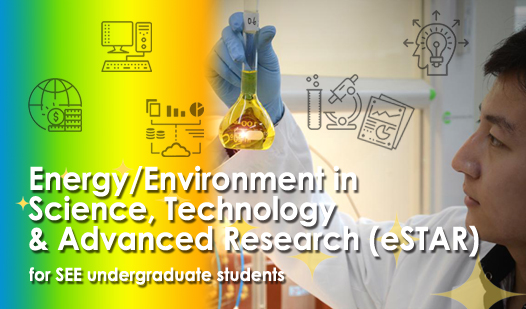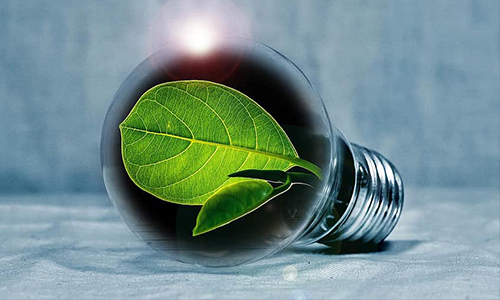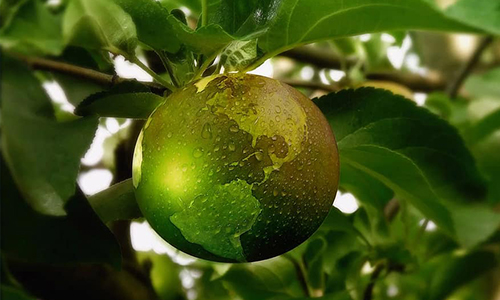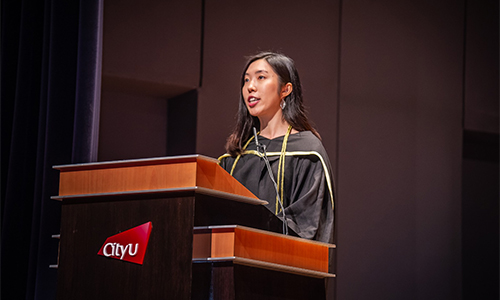Main navigation
-
Undergraduate Programmes
- Double Degree Programme – Bachelor of Engineering in Environmental Science and Engineering and Bachelor of Business Administration in Finance
- Admissions to Undergraduate Majors (2024 Entry)
- Bachelor of Engineering in Energy Science and Engineering
- Bachelor of Engineering in Environmental Science and Engineering
- Professional Development (SEE2000 & SEE4000)
- Energy/Environment in Science, Technology & Advanced Research (eSTAR)
- Minor in Atmospheric and Climate Science
- Minor in Energy Technology
- Minor in Sustainability
- Gateway Education Courses
- Student Advising Handbook
- Master of Science in Energy and Environment
- Research Degree Programme
Admissions to Undergraduate Majors (2024 Entry)
(I) Energy/Environment in Science, Technology & Advanced Research (eSTAR)

“Energy/Environment in Science, Technology & Advanced Research (eSTAR)” is a stream introduced in our two existing undergraduate programmes, i.e. BEngESE and BEngEVE, for implementation from Semester A 2021/22, applicable to normative 4-year degree students of the 2020/21 entry and thereafter. With the introduction of the stream, it is expected that students will be equipped with cutting-edge skills and knowledge in emerging fields. For details, please refer to the following page:
https://www.cityu.edu.hk/see/programmes/undergraduate-programmes/eSTAR
(III) Why study energy engineering in SEE?

What is energy engineering?
Energy engineering addresses the pressing energy issues and the associated environmental problems in the modern society. The ever-increasing energy demand and dependence of fossil fuels has led to challenges like energy security, pollution and climate change. Energy engineering transcends the boundaries of traditional engineering disciplines to address these intricate issues with innovative solutions.
Key areas in energy engineering include
- Energy management and efficiency
- Renewable energy
- Energy storage and distribution
- Energy-related pollution control and treatment
Energy engineering is extremely diverse and attracts people with different interests and talents. Specific problems may require specialised knowledge of materials science, electrical engineering, chemical engineering or mechanical engineering.
What do energy engineering students learn?
To prepare students for their future careers, the Bachelor of Engineering in Energy Science and Engineering (ESE) comprises courses in science, engineering, and energy applications. Students will study topics like energy efficiency in buildings, renewable energy technology, energy storage and distribution, as well as experimental and computational techniques. Since energy issues and the energy-related environmental problems cannot be considered in isolation, students will also be trained in economics, policy, pollution treatment and environmental impact assessment.
What will ESE students do after graduation?
Due to substantial energy utilization and the accompanying environmental problems, energy engineering is a fast-growing discipline in Hong Kong. Our graduates are now pursuing careers in energy management in buildings, power generation, green technology development and consultancy on energy and environmental issues. Some of our graduates also pursue advanced degrees in related areas.
The ESE programme is accredited by The Hong Kong Institution of Engineers (HKIE) in both the energy and environmental disciplines. Opportunities in Hong Kong for the ESE graduates will almost certainly continue to increase.
(IV) Why study environmental engineering in SEE?

What is environmental engineering?
Environmental engineering is concerned with the solution of environmental problems. Examples include
- Air pollution
- Marine pollution
- Water treatment
- Waste and recycling
- Sustainability
Nowadays environmental engineering is becoming increasingly important. With the challenges posed by urbanisation and climate change, environmental engineers are needed to safeguard human health, protect the environment and help build a sustainable society. Environmental engineering is an exciting and rewarding career for young people who want to use their technical skills to improve society.
Environmental engineering is extremely diverse and attracts people with different interests and talents. Specific problems may require specialised knowledge of biology, chemical engineering or mechanical engineering. Environmental engineers may work in the field, laboratory or office.
What do environmental engineering students learn?
To prepare students for their future careers, the Bachelor of Engineering in Environmental Science and Engineering (EVE) comprises courses in science, engineering, and environmental applications. Students will study air pollution, wastewater treatment and water resources, among other topics, as well as experimental and computational techniques. Since environmental problems cannot be considered in isolation, students will also be trained in sustainability, environmental management and environmental impact assessment.
What will EVE students do after graduation?
Since Hong Kong is a small but densely populated place with an advanced economy, we are facing many pressing environmental challenges. EVE graduates are now pursuing careers in monitoring or mitigating environmental pollution for government departments, developing new technologies for engineering firms, and advising companies on sustainable practices.
The EVE programme has received provisional accreditation from The Hong Kong Institution of Engineers (HKIE) in the environmental discipline. Opportunities in Hong Kong for the EVE graduates will almost certainly continue to increase.
Admission Arrangements for Undergraduate Programmes
For admission to the School of Energy and Environment (SEE), students will apply through the Joint University Programmes Admissions System (JUPAS) or the route of direct / non-JUPAS application subject to their individual qualifications.
JUPAS Applicants
Hong Kong Diploma of Secondary Education (HKDSE) students may apply for admission to first-year studies in our degree programmes via JUPAS (JUPAS Catalogue No.: JS1051). During their first year, students will be admitted with an undeclared major and study a broad range of Gateway Education (GE) courses as well as core-curricular courses designed by the School. After one year of study in the School, they will enter one of the following majors:
- Bachelor of Engineering in Energy Science and Engineering (BEngESE)
- Bachelor of Engineering in Environmental Science and Engineering (BEngEVE)
Top 40% of students in the School will be allocated their first choice major upon satisfying the selection criteria stipulated by the University while the remaining 60% of students will be allocated a major subject to availability of places and the selection criteria stipulated by SEE.
Direct / Non-JUPAS Applicants
Students with qualifications other than HKDSE may apply for admission to first-year studies or with advanced standing in our degree programmes via the route of direct / non-JUPAS application. Generally speaking, there are mainly two types of applicants with corresponding admission arrangements as follows:
(A) Admission to First-Year Studies (Four-Year Curriculum) [Programme code: 1051]
Same as those admitted via JUPAS, applicants holding a 12-year school-leaving qualification, or a partially completed sub-degree qualification will study a broad range of Gateway Education (GE) courses as well as core-curricular courses designed by the School with an undeclared major. They will enter either BEngESE or BEngEVE after one year of study in the School. Same mechanism of major allocation is applicable to these applicants.
(B) Admission with Advanced Standing I [Programme code: 1694A (for ESE); 1702A (for EVE)]
Applicants holding a 13-year school-leaving qualification, an Associate Degree/Higher Diploma or other equivalent qualifications, an International Baccalaureate (IB) Diploma, a General Certificate of Education Advanced Level (GCEAL) qualification or degree transfer students may apply for admission to first-year studies in our degree programmes, or admission to a major in Energy Science and Engineering OR Environmental Science and Engineering with Advanced Standing I (non-senior-year).
Apply for Admission
Entrance Requirements for Undergraduate Programmes
JUPAS Applicants
For admission to the School of Energy and Environment, JUPAS applicants must meet the requirements as shown in the table below. The levels indicated are the minimum acceptable but possession of such qualifications in no way guarantees acceptance.
| Core Subjects | Elective Subjects (including M1 / M2) |
||||
|---|---|---|---|---|---|
| Chinese Language | English Language | Mathematics (Compulsory Part) |
Citizenship and Social Development | Elective 1 | Elective 2 |
| Level 3 | Level 3 | Level 2 | Attained | Level 3 in one elective subject from Biology, Chemistry, or Physics | Level 3 in any elective subjects |
Direct / Non-JUPAS Applicants
In addition to meeting the General Entrance Requirements as stipulated by the University, as a guide for applications, direct / non-JUPAS applicants are expected to have studied Mathematics and subjects related to Biology, Chemistry, Physics and/or Science at high school or post-secondary institution.
Assessment of Applications
For JUPAS applicants who have fulfilled the minimum entrance requirements, various types of admission scores are calculated to help the selection of applicants. Presented below is the Main Admission Score, with weighting applied, for main consideration.
| Admission Score (with Weighting Applied) for Main Consideration | |||||
|---|---|---|---|---|---|
| No. of subjects | Subject Weighting | ||||
| Chinese Language | English Language | Mathematics (Compulsory Part) |
Elective 1 | Elective 2 (including M1/M2) | |
| Best 5 subjects (including English Language, Mathematics, and one subject from Biology, Chemistry, or Physics) | 1 | 2 | 2.5 | 2.5 : Biology, Chemistry, or Physics |
1.5 : Biology, Chemistry, Geography, M1/M2, or Physics 1 : Other elective subjects |
Scoring Scale
Category A Core and Elective Subjects (including M1/M2)
| Level | 5** | 5* | 5 | 4 | 3 | 2 | 1 |
| Score | 7 | 6 | 5 | 4 | 3 | 2 | 1 |
Category C Other Language Subjects
| Grade | A | B | C | D | E |
| Score | 5 | 4 | 3 | 2 | 1 |
Example
✔ Scores included in the calculation of the total weighted score [best 5 subjects with the highest weighted scores].
| Subjects | HKDSE Results (Level) |
School of Energy and Environment Weighted Main Admission Score (score x weighting) |
|
|---|---|---|---|
| Chinese Language | 5 | 5 x 1 | ✔ |
| English Language | 5 | 5 x 2 | ✔ |
| Mathematics (Compulsory Part) | 3 | 3 x 2.5 | ✔ |
| Physics+ | 5 | 5 x 2.5 | ✔ |
| Chinese History+ | 5* | 6 x 1 | ✔ |
| Chemistry | 3 | N/A (3 x 1.5) | ✖ |
| Total weighted score | 41 | ||
+ Physics is considered as Elective 1 while Chinese History as Elective 2 in the calculation of the Weighted Main Admission Score.
Interview Arrangements
Group interview will be arranged on a selective basis before the release of HKDSE results in July 2024.
| Date: | July 2024 (Exact date to be confirmed) |
| Mode of Assessment: | Interview only |
| Mode of Interview: | Group interview |
| Duration: | 30 minutes |
| Language: | English |
| Enquiries: | School of Energy and Environment (Tel) 3442 2412 (Email) see.enquiry@cityu.edu.hk |
